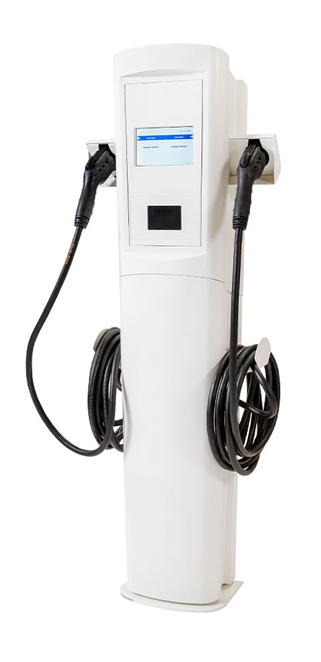Parking Meets Power: How EV Charging Stations Transform Parking Garages
As electric and hybrid vehicle adoption continues to accelerate, parking facility operators face a golden opportunity to modernize their infrastructures and create new revenue streams. Installing commercial EV chargers in parking garages isn’t just about keeping pace with current demand—it’s about positioning your facility for the future of transportation. Here’s why parking garage operators should consider investing in garage EV charging stations.

EV charging solutions for different parking facilities
The optimal EV charging setup varies significantly based on your facility type and clientele.
- Office building garages primarily serve daily commuters, requiring multiple Level 2 chargers to support long-term parking during business hours. However, adding a Level 3 charger could serve short-term visitors. These facilities particularly benefit from smart scheduling systems to manage peak demand and can offer attractive corporate charging packages.
- Medical facilities face unique challenges, serving both short-term visitors and long-term staff parking needs. While staff areas benefit from Level 2 charging solutions, visitor areas might require faster Level 3 charging options to accommodate what is usually a quick turnover. These facilities must also ensure charging stations meet ADA compliance requirements and are equipped to handle their own EV fleet vehicles.
- Airport parking presents distinct opportunities with its mix of extended-stay travelers, kiss-and-ride drop-offs or pick-ups and high-turnover rental car operations. Some airport parking garages use a valet service to charge vehicles for travelers and rotate cars to avoid the charger being blocked by a single car for a traveler on an extended trip. Rental car facilities and ride-share areas can benefit most from Level 3 charging to maintain a quick vehicle turnover.
- Car parks and parking lot EV chargers that serve events or city areas serve a mix of employees who work an entire shift and visitors with a shorter dwell time. Designated parking areas for employees can be outfitted with Level 2 charging ports, while spaces with more rapid turnover can be outfitted with Level 3 chargers or a mixture of the two, considering the type of venue served by the parking garage.
- Retail shopping areas need to stay competitive in areas where buyers have choices of where to shop. EV drivers are also interested in “killing two birds with one stone” and getting multiple errands done at once or a bonus as they take care of another activity.
- Hotels and resorts with a parking garage can integrate EV charging into their luxury amenities, offering overnight Level 2 charging for guests while maintaining several Level 3 chargers for day visitors and local traffic. Many hotels successfully incorporate charging services into existing valet operations and rewards programs.
- Residential parking facilities require a different approach, focusing on dedicated Level 2 charging solutions that residents can rely on daily. These installations often work best with monthly billing integration and scheduled charging to optimize electricity costs while ensuring reliability for residents.
Why install commercial EV chargers?
- Create new revenue streams – Transform your parking facility into a dual-purpose parking and charging hub. Set customized pricing for charging sessions to cover electricity costs and generate additional revenue beyond traditional parking fees. This diversification can significantly enhance your facility’s profitability.
- Competitive differentiation – In an increasingly competitive market, EV charging stations set your facility apart. As more businesses and consumers transition to electric vehicles, having charging infrastructure becomes a critical differentiator that can influence where people choose to park.
- Support Corporate Clients – Many businesses are transitioning their fleets to electric vehicles. By offering EV charging, parking garages in downtown areas or linked with an office building can position their facilities as attractive options for corporate clients seeking office space to rent, with the parking garage EV charging stations an added bonus for fleet vehicles, employees, or visitors during business hours.
- Future-Proof Your Investment – With major automakers committing to electric vehicle production, installing charging infrastructure now prepares your facility for increasing demand. Modern chargers with modular design can be upgraded as needed to accommodate future charging requirements.
- Enhance Property Value – EV charging infrastructure adds value to your property, making it more attractive to potential buyers or lessees. It demonstrates a commitment to sustainability and modern amenities that today’s real estate market demands.
- Meet Sustainability Goals – Installing EV chargers helps reduce carbon emissions and supports environmental initiatives. This can help meet local green building requirements and attract environmentally conscious customers and corporate partners.
Choosing the right type of commercial EV charger
Parking facilities should consider both Level 2 and Level 3 (DC fast charging) options to serve different parking scenarios and customer needs.

Level 2 EV chargers
Level 2 EV chargers serve distinct purposes for many parking garage charging station scenarios:
- Cost-effective: They are less expensive to install and operate than DC fast chargers.
- Shift compatible: They can fully charge most EVs in 4-8 hours, suitable for many types of parking garage clientele such as shift, office or medical workers, or long-term visitors
- Universal compatibility: Currently, Level 2 chargers are considered universal across all models.
- Lower power requirements: They don’t require as much electrical infrastructure as DC fast chargers.

Level 3 EV chargers (DC fast charging)
While more expensive, DC fast chargers offer several benefits:
- Rapid charging: They can charge most EVs to 80% in 30-60 minutes, which is ideal for short-term parking scenarios such as shopping excursions, medical appointments, etc.
- Attract more customers: The speed and convenience of fast charging can pose an attractive feature to corporate clients linked to nearby office space.
- Scalable installation: DC fast chargers are scalable to meet future demand as EV adoption among parking garage clientele increases.
- Support high-end EVs: Many luxury and performance EVs benefit from faster charging capabilities, a consideration for a parking garage linked to hotels, restaurants and high-end shopping, or event venues.
- Revenue capabilities: This style charger is easy to outfit with a touchscreen for brand messaging and payment options for after-hours revenue generation.
Why Choose BTC POWER
BTC POWER understands the unique needs of parking garage/facility operators. With more than 22,000 commercial EV charging stations installed worldwide and an industry-leading 98% uptime, we provide reliable, scalable charging solutions from 7.2 kW to 350 kW. As a North American commercial EV charger manufacturer since 1999, we incorporate real-world experience into every charging station we design, ensuring your investment delivers long-term value and reliability.
Frequently Asked Questions
Can parking garages support EVs?
Modern parking garages can accommodate EV chargers with proper electrical assessments and strategic installations. Facilities are now designing to provide future-proof upgrades in EV battery capacity as they install parking garage EV chargers. They are looking for systems that offer kW availability and room for expansion as EV adoption increases. Many garages are implementing tiered charging options (Level 2 and DC fast charging) to meet diverse user needs while managing power demands through innovative load-balancing technology.
Leading EV charger manufacturers like BTC POWER offer solutions for both needs: its AC-Level 2 product family provides reliable commercial charging with multiple authentication methods (RFID, credit card, QR code, mobile app), while their Gen 4 All-in-One DC Fast Charger features a modular system designed explicitly for future upgrades.
This modular approach is particularly valuable for parking facilities planning long-term EV charging infrastructure, as it allows for capacity expansion from 120kW to 180kW without replacing the entire unit. This forward-planning capability will be beneficial as EV charging technology and adoption evolve. In addition, multiple authentication methods allow parking garages to implement loyalty programs or earn revenue from the charging stations.
Can I have an EV charger in my parking garage?
A parking garage can have an EV charger or a set of charging stations. A parking garage EV charger installation adds a desirable amenity to medical centers, offices, retail spaces, and residential communities. Before proceeding, conduct an electrical assessment to determine your facility’s available power capacity. Most commercial garages have sufficient electrical capacity for Level 2 chargers, but older buildings may require panel upgrades. The key is working with qualified electricians who understand local codes and can implement solutions that align with your facility’s specific layout and power distribution.
When planning your installation, consider future-proofing your investment by selecting systems with modular expansion capabilities. Additionally, strategic placement near electrical rooms can minimize EV charger installation costs while ensuring proper access. Many property owners start with 2-4 commercial EV chargers before expanding based on usage patterns and tenant feedback.
Why can’t EVs be towed?
EVs can be towed but require specific procedures. Traditional towing methods may damage the electric motors and regenerative braking systems. EVs should be towed with all wheels off the ground or using flatbed trucks. This misconception is essential for parking garage operators to understand when managing improperly parked vehicles.
Where is the best place to put an EV charger in a parking garage?
The optimal locations for EV chargers in parking garages are in well-lit, accessible areas for safety and user convenience. Consider implementing a mix of premium spots near entrances and standard locations throughout the facility to balance convenience with maximizing the number of chargers. Unlike open parking lots that may require charging towers with dedicated electrical service, parking garages often have existing electrical infrastructure that can be leveraged, giving you more flexibility in placement. While planning EV charger installation in a parking garage, consider the placement of a power cabinet for any DC Level 3 charging station, like the Gen 4 360 kW Power Cabinet from BTC POWER, the leading EV charger manufacturer in North America. The power cabinet is engineered and designed with a small footprint to facilitate installation in areas with limited space.
When planning your installation, focus on creating a positive user experience with clear signage, adequate lighting, and protection from vehicle traffic. Installation costs are certainly a consideration but shouldn’t compromise ideal user placements. For multi-level structures, lower floors often provide better accessibility for all users, including those with disabilities. Consider future expansion needs when designing your initial charger layout to avoid costly infrastructure changes later.
How much does your electric bill go up per electric car charger?
Electric bills will go up approximately $30-75 monthly per active port for a typical Level 2 workplace charger, assuming 4-6 hours of daily use. For perspective, Kelly Blue Book notes that an average driver (1,207 miles monthly) would use about 402 kWh, costing approximately $65 at home rates (16.26¢/kWh) versus $201 at public charging stations (50¢/kWh). The actual impact depends on local electricity rates and usage patterns. Many businesses implement energy management systems during off-peak hours to reduce costs. The costs will reflect the drivers’ driving habits that utilize the parking garage EV chargers.
Is it safe to put an EV charger in a garage?
Putting an EV charger in a garage is safe when installed by certified professionals. Modern units feature multiple safeguards, including ground-fault protection, automatic shut-offs, and weatherproof designs. Fire safety concerns are minimal as quality chargers include thermal monitoring and overload protection. The key is professional installation and regular maintenance.
Many parking garage facilities have successfully integrated commercial EV charging infrastructure with proper planning. Building codes and industry standards have evolved to address safety considerations specific to enclosed spaces. Most commercial chargers are UL-listed and designed to operate safely in garage environments. Also, proper parking structure ventilation further mitigates any minimal risks associated with charging electric vehicles.
For optimal safety and the comfort of guests and regular patrons using the parking garage EV chargers, facility operators should implement regular inspection schedules, ensure clear emergency procedures, and consider installing charging status indicators. These measures prevent potential issues and build trust with users who rely on consistently functioning charging stations. Intelligent charging systems can also provide remote monitoring capabilities to quickly identify and address concerns before they impact the user experience.
